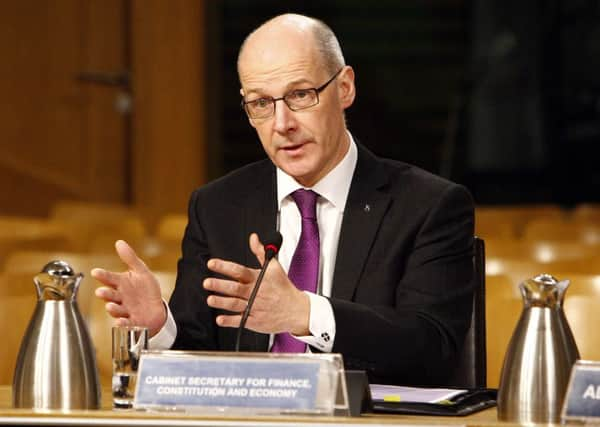Budget: Swinney vows to defy ‘Osborne austerity’


Mr Swinney made his pledge as a series of question marks were raised about the state of Scotland’s public finances.
Ahead of his Holyrood statement, Mr Swinney claimed Chancellor George Osborne had imposed real terms cuts on Scotland which would see more than £1 billion slashed from its budget by the end of the decade.
Advertisement
Hide AdAdvertisement
Hide Ad“I am determined to protect key priorities such as schools, hospitals and police,” Mr Swinney said. “However, as a consequence of UK government spending decisions, the Scottish Budget will continue to fall in real terms – as it has since 2010 – until the end of this decade.
“Despite these pressures, the Scottish Government will defend and protect the key priorities that the people of Scotland expect us to deliver on. Critical pillars of Scottish life – our schools, hospitals and police – will not be sacrificed to the Chancellor’s austerity obsession.”
Meanwhile, a Conservative business minister warned that Scotland would be “entirely bankrupt” and probably “scuttling” for help had it secured independence.
Nick Boles told MPs he would use a meeting with oil and gas companies to discuss their views on the SNP’s oil revenue predictions ahead of last year’s independence referendum.
The Scottish Government’s white paper based its financial calculations on the price of North Sea oil coming in at more than $100 a barrel. Since then the price has fallen dramatically and at one point was close to $40.
In the House of Commons, Mr Boles told the SNP MP Hannah Bardell that he would be delighted to meet with the oil industry after she warned that the government’s apprenticeship levy could result in oil and gas firms being charged twice when it comes to training.
Mr Boles said: “I’ll be asking them what they thought of your party’s plans for Scotland’s economy that rested upon oil prices at a $100 a barrel, which would now see an independent Scotland entirely bankrupt and probably scuttling to the IMF (International Monetary Fund).”
His remarks came as an investigation by an English newspaper predicted public sector borrowing could reach £50bn by the end of the decade. A Scottish Government spokeswoman said a prudent view was taken of borrowing, which was limited to 5 per cent of its day-to-day budget.